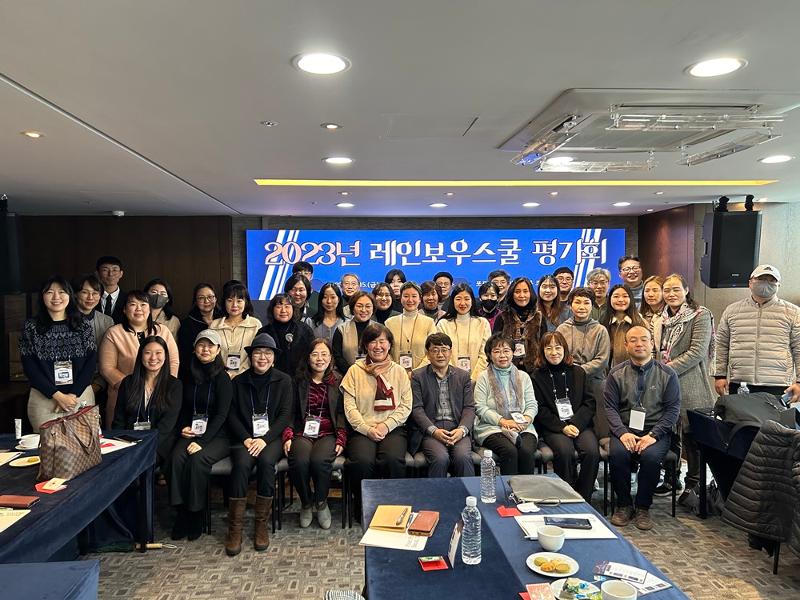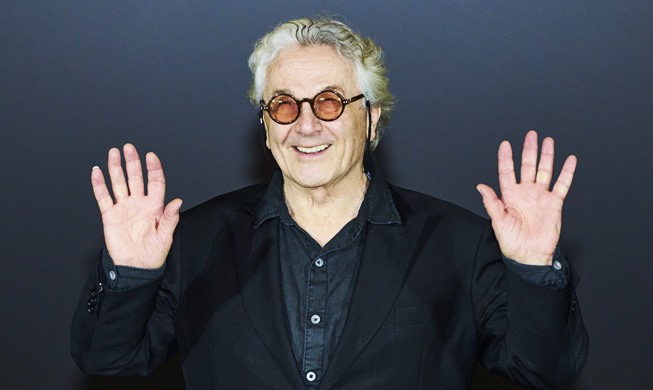-
 Korea.net's 24-hour YouTube channel
Korea.net's 24-hour YouTube channel- NEWS FOCUS
- ABOUT KOREA
- EVENTS
- RESOURCES
- GOVERNMENT
- ABOUT US

Participants at an event to evaluate Rainbow Schools on Dec. 15, 2023, take a group photo at the hotel Four Points by Sheraton Josun, Seoul Station in Seoul's Yongsan-gu District. (Migrant Youth Foundation)
By Lee Jihae
Rainbow School, which helps foreign-born migrant teens settle and adjust to life in the country, will have 21 branches in 11 cities and provinces nationwide.
The Migrant Youth Foundation on April 2 said it completed preparations for running the school as an educational support project for such youth and launched the first semester the day before.
Youth born abroad with a migrant background can attend regardless of nationality or residency status. Those born in Korea who struggle with the Korean language due to previous stints overseas are also eligible.
The courses are divided into three categories: early stage of arrival, settlement support and mixed.
Geared for those with under two years of living experience in the nation, the early stage of arrival curriculum offers education in the Korean language, regional society and culture of daily life in the nation.
Settlement support is for teens who have lived in Korea for over two years. It offers education in Korean, preparation for the general equivalency exam for a school diploma and supplementary courses on school subjects.
Mixed courses are offered only in areas with a high concentration of migrant youths but suffering from limited resources and services. Half of the students in this category have lived in Korea for less than two years and the other half for longer.
This curriculum covers the Korean language and specialized education such as civic education and understanding of provincial culture to help them adapt to society there.
Curricula are designed to provide support based on when such teens settled in the country.
The schools are offered in 11 cities and provinces at 21 institutions in the following areas: Seoul (Guro-gu and Eunpyeong-gu districts); Incheon (Yeonsu-gu); Gyeonggi-do Province (Gwangju, Bucheon, Siheung, Ansan, Yangju, Pyeongtaek and Hwaseong); Busan (Sasang-gu); Ulsan (Jung-gu); Gyeongsangnam-do Province (Gimhae); Gyeongsangbuk-do Province (Gyeongju); Chungcheongbuk-do Province (Cheongju); Chungcheongnam-do Province (Asan and Hongseong-gun County); Sejong (town of Jochiwon-eup) and Jeollabuk-do Province (Iksan).
Rainbow School runs for 30 weeks from April 1 to Nov. 10. Rainbow School Plus in July is a student exchange program for participating schools nationwide.
Those who wish to attend can contact the foundation (www.rainbowyouth.or.kr) or the school's partner institution in each region.
The foundation's executive director Yu Ki-og said, "We will cooperate with each regional institution to run Rainbow School so that all youths can fully demonstrate their capabilities without being left out."
jihlee08@korea.kr
Most popular
- First hearing-impaired K-pop act hopes for 'barrier-free world'
- 'Mad Max' director impressed by 'cinema-literate' Korean viewers
- Romanian presidential couple visits national cemetery
- President Yoon, Japan PM pledge better trilateral ties with US
- President, Romania pledge better defense, nuclear power ties













